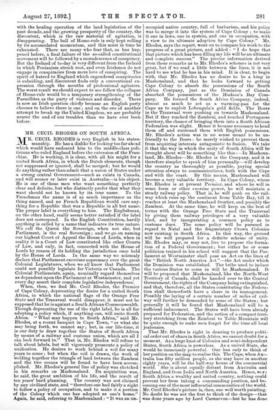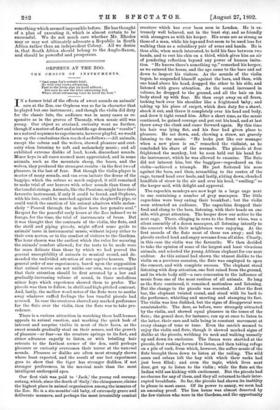MR. CECIL RHODES ON SOUTH AFRICA.
MR. CECIL RHODES is very English in his states- manship. He has a dislike for looking too far ahead which would have endeared him to the middle-class poli- ticians who ruled England before the extension of the Fran- chise. He is working, it is clear, with all his might for a united South Africa, in which the Dutch elements, though not suppressed or ignored, shall be merged; but he would do anything rather than admit that a union of States under a strong central Government—such as exists in Canada, and will sooner or later exist in Australia—is his object. He is one of those men who want something perfectly clear and definite, but who distinctly prefer that what they want should not be known by its true name. To the Frenchman the name is of as much importance as the thing named, and no French Republican would care any- thing for a Republic that was a Republic in all but name. The proper label is everything to him. The Englishman, on the other hand, really seems better satisfied if the label does not correspond. In the English Constitution, hardly anything is called by a name that indicates its true nature. We call the Queen the Sovereign, when not she, but Parliament, is the real Sovereign ; and we go on naming our highest Court of Appeal the House of Lords, when in reality it is a Court of Law constituted like other Courts of Law, and only, in fact, connected with the House of Lords by reason of its holding the jurisdiction once held by the House of Lords. In the same way we solemnly declare that Parliament exercises supremacy over the great Colonial Legislatures, when we all know that Parliament could not possibly legislate for Victoria or Canada. The Colonial Parliaments, again, nominally regard themselves as dependent upon the Parliament at Westminster, and yet every day assert their complete legislative independence. When, then, we find Mr. Cecil Rhodes, the Premier of Cape Colony, deprecating the desire for a united South Africa, in which the national flags of the Orange Free State and the Transvaal would disappear, it must not be supposed that he is against a South African Commonwealth. Though deprecating the use of the right label, he is all for adopting a policy which, if anything can, will unite South Africa. "What may happen to South Africa," said Mr. Rhodes, at a recent banquet in Cape Town, "or what she may bring forth, we cannot say ; but, in our life-time, it is our duty to draw together the States of South Africa by means of a railway and customs union, which are all I can look forward to." That is, Mr. Rhodes will refuse to talk about labels, but will vigorously prosecute a policy of unification. He desires to work behind a veil for many years to come ; but when the veil is drawn, the work of welding together the triangle of land between the Zambesi and the two oceans will be found to have been accom- plished. Mr. Rhodes's general line of policy was sketched in his remarks on Mashonaland. Its acquisition was, he said, the great ambition of his life, and the result of ten years' hard planning. The country was not claimed by any civilised state, and "therefore one had fairly a right to follow a policy of occupation, and to make it a portion of the Colony which one has adopted as one's home." Again, he said, referring to Mashonaland : "It was an un- occupied native country, full of barbarism, and his policy was to merge it into the system of Cape Colony ; to make it one in laws, one in system, and one in occupation, with a view to its ultimate adoption by Cape Colony." Mr. Rhodes, says the report, went on to compare his work to the progress of a great picture, and added : "I do hope that that picture which has been filling my life will be an ultimate and complete success." The precise information derived from these remarks as to Mr. Rhodes's schemes is not very great, but if we read a little between the lines, it is not hard to see what he has in his mind. It is clear, to begin with, that Mr. Rhodes has no desire to be a king in Mashonaland, and that he looks forward to getting Cape Colony to absorb the possessions of the South Africa Company, just as the Dominion of Canada absorbed the possessions of the Hudson's Bay Com- pany. He formed the South Africa Company, indeed, almost as much to act as a warming-pan for the Cape as to exploit Lobengula's gold fields. The Boers in the Transvaal were pushing on towards Mashonaland. But if they reached the Zambesi, and touched Portuguese territory, the chance of bringing them into a South African Federation was slight. Hence it became necessary to head them off and surround them with English possessions. Mr. Rhodes's action was in no sense meant to be un- friendly to the Boors: he merely wished to prevent them from acquiring interests antagonistic to fusion. We take it that the way in which the unity of South Africa will be brought about will be something like this :—In Mashona- land, Mr. Rhodes—Mr. Rhodes is the Company, and it is therefore simpler to speak of him personally—will develop the country as thoroughly as possible, paying special attention always to communications, both with the Cape and with the coast. By this means, Mashonaland will become a very valuable territory. In Cape Colony, where Mr. Rhodes is at present Premier, and where he will in some form or other exercise power, he will maintain a steady railway policy. That is, he will push on the rail- way which runs up the continent from Table Bay, till it reaches at least the Mashonaland frontier, and possibly the Zambesi. At the same time, he will keep on the best of terms with the Orange Free State and the Transvaal by giving them railway privileges of a very valuable kind, and by inaugurating a common policy as to customs dues. The same policy will be pursued in regard to Natal and the fragmentary Crown Colonies now existing in South Africa. In this way, the ground will be well prepared for a definite scheme of unity. Mr. Rhodes may, or may not, live to propose the forma- tion of a Federal Government ; but either he or some politician trained in his school will suggest that the Par- liament at Westminster shall pass an Act on the lines of the "British North America Act "—the Act under which the Dominion was established. The bribe used to induce the various States to come in will be Mashonaland. It will be proposed that Mashonaland, like the North-West Territory of Canada, shall be handed over to the Central Government, the rights of the Company being extinguished, and that, therefore, all the States constituting the Federa- tion shall thenceforth have a share in its management. Possibly the laying of a certain number of miles of rail- way will further be demanded by some of the States ; but generally it will be found that Mashonaland will be a sufficient inducement. The States will have been already prepared for Federation, and the notion of a compact terri- tory stretching from the Zambesi to Table Mountain will be quite enough to make men forget for the time all local jealousies.
That Mr. Rhodes is right in desiring to produce politi- cal order out of chaos in South Africa, we cannot doubt for a moment. As a huge knot of Colonies and semi-independent States, South Africa is powerless. As a united State, she would be immensely powerful. One has only to think of her position on the map to realise this. The Cape, when A tv- tralia has fifty million people, as she may have in another eighty years, will be the half-way house of the commercial world. She is about equally distant from Australia and England, and from India. and North America. Hence, van South Africa a wealthy and united country, nothing could prevent her from taking a commanding position, and be- coming one of the most influential communities of the world. Mr. Cecil Rhodes's picture is, then, one well worth painting.
No doubt he was not the first to think of the design—that was done years ago by Lord Carnarvon—but he has done
something which seemed impossible before. He has thought of a plan of executing it, which is almost certain to be successful. We do not much care whether Mr. Rhodes may or may not ultimately advocate a Republic in South Africa rather than an independent Colony. All we desire is, that South Africa should belong to the Anglo-Saxon, and should be powerful and prosperous.



































 Previous page
Previous page